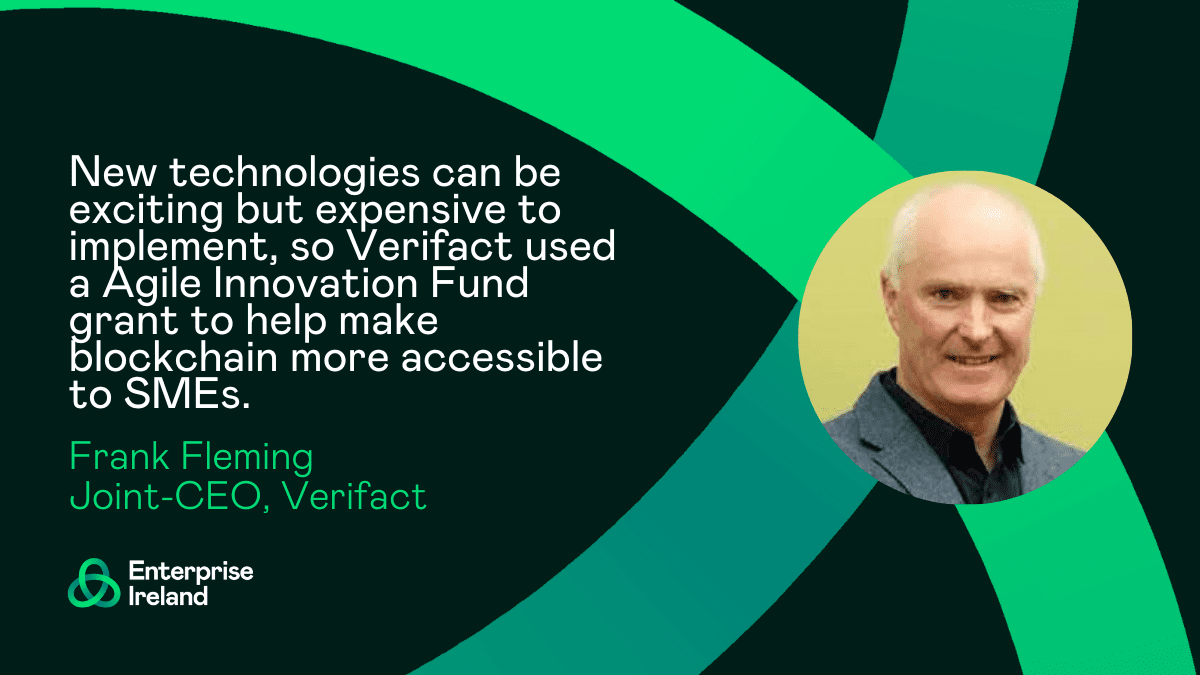
New technologies can be exciting but expensive to implement, so Verifact used the Agile Innovation Fund to help make blockchain more accessible to SMEs.
Verifact used the Agile Innovation Fund to develop its own blockchain platform, which the company is now using to provide affordable solutions to small and medium-sized companies.
Verifact is a software as a service company based in Cork City, and Joint CEO, Eibhlín O’Sullivan says: “We focus on supply chains. It’s incorporating everything about food safety, traceability and sustainability. The idea is that we help people. Our tagline is ‘Helping you join the dots’, so we help people take the information they have and put it on platforms that can help. The company was founded in 2009 by Frank Fleming. He’s the CEO. He’s a former commercial fisherman actually himself. So he began in 2009, by helping the seafood sector in relation to certification sustainability. In 2015, he moved into the software sector”.
A major part of Verifact’s business is a verification, and blockchain is the ideal tech for this industry. At its most basic, blockchain is a database, but unlike a traditional database where data is stored in one place, blockchain stores it in many different locations (called peers). The information can’t be changed in one place without being changed everywhere else, and it can’t be deleted.
Making it accessible
Initially Verifact was using IBM’s blockchain platform, which while top of the line, was also high cost. Verifact’s focus has always been on making things accessible, particularly for the small to medium-sized enterprises, and that’s why the company wanted to invest in its own platform and grow its offerings using the Agile Innovation Fund.
Building a blockchain network involves a lot of work and substantial risk. But Verifact recognised the opportunities for growth having its own platform would bring. The Agile Innovation Fund allowed the company to cushion some of the risk and build the platform.
Developing the platform involved 18 to 24 months of solid R&D work and then it had to be brought to the market, says Eibhlín: “That’s where I think the Enterprise Ireland funding is extremely valuable and beneficial to companies like ourselves, because it provided us with that little bit of a safety net. Yes, we obviously still had to make significant investment from a company perspective, but it was slightly less, so it made it more viable”.
New products
Verifact developed two new product offerings as a result of the project, which are out to market at the moment and a third has been launched on a small scale. The first covers supply chains, the second is in relation to proof points and taking data regarding those, and the third has to do with recycling end-of-life fishing nets to be repurposed and reused for the first project. Verifact has been able to use the blockchain platform to track certain proof points to show which fishing boat the net came from.
Now that Verifact has a blockchain platform of its own, it makes it very cost-efficient for the company to use and to provide to others, explains Eibhlín: “We can come up with a product offering to smaller to medium-sized business that is more financially viable for them and will sell”.
Growing beyond Ireland
The funding has also allowed the company to expand beyond Ireland. Verifact is building a proprietary platform for a UK client that they hope to tweak for other users. The company also operates in the Netherlands and is hoping to expand further soon.
Eibhlín says the application process is very accessible. Verifact put a short proposal together, got feedback from Enterprise Ireland, and were advised that the project was worth pursuing. She recommends picking the right project. It should be something that is going to be commercially viable from the State’s and your company’s perspective. The Fund offers opportunities to businesses to take on innovative projects, she says: “I think it’s a really valuable fund if you’re a medium-sized company, or like ourselves a scale-up company, that wants to take on what is a risky project that if you had to commit all the company’s funding to it, you probably couldn’t do it”.
What you need to do for the Agile Innovation Fund application is what you should be doing anyway before you undertake any projects this size Eibhlín says, such as your financials and your project plan. With Enterprise Ireland, Verifact’s experience is that if you hit a roadblock, the organisation will try find you someone to help you get past that.
Verifact is delighted with how the project worked out: “The project itself was successful, but we’ve been able to use that then to develop more projects, get into other markets and so on. It’s been very, very useful”.


